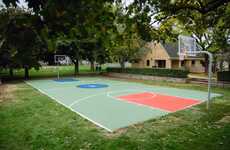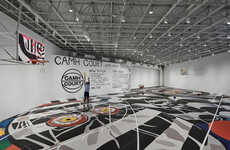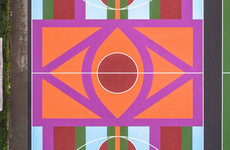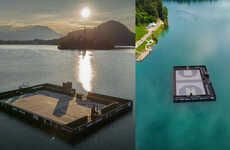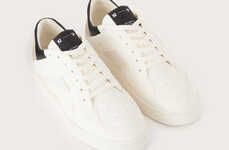
The Shek Lei Grind Court is Constructed With 20,000 Used Shoes
Josh Thompson-Persaud — June 17, 2021 — Eco
References: news.nike & luxurylaunches
The Shek Lei Grind Court, a community basketball court in Hong Kong, is sustainably constructed from 20,000 pairs of used Nike shoes. The basketball court is made with Nike Grind, a proprietary material that is sourced from recycled shoe components like plastic, leather, rubber, foam, and more. Overtop the Nike Grind material, the Shek Lei Grind Court features whimsical cartoon graphics from British artist James Jarvis that imbue the space with a friendly feel.
The basketball court is part of an ongoing Nike project to contribute to community development through sport-focused initiatives. Due to the court's close proximity to 14 schools in the district, it will provide opportunities for play for locals. Alongside the refurbishing of the Shek Lei Grind Court, Nike partnered with InspiringHK which promotes social mobility and inclusivity through sports.
Image Credit: Luxury Launches
The basketball court is part of an ongoing Nike project to contribute to community development through sport-focused initiatives. Due to the court's close proximity to 14 schools in the district, it will provide opportunities for play for locals. Alongside the refurbishing of the Shek Lei Grind Court, Nike partnered with InspiringHK which promotes social mobility and inclusivity through sports.
Image Credit: Luxury Launches
Trend Themes
1. Sustainably-made Sports Facilities - Sustainability-focused alternatives to traditional sports facilities opens up new opportunities for eco-conscious consumers and businesses.
2. Circular Economy in Athletic Apparel - Incorporating recycled shoe components into athletic apparel leads to a more efficient and greener supply chain.
3. Art-inspired Public Spaces - Commissioning artists to design public facilities creates unique, community-driven gathering places.
Industry Implications
1. Athletic Apparel - Using recycled shoe components in the production process would demonstrate a commitment to sustainability among athletic apparel companies.
2. Construction - Incorporating recycled materials in construction projects can lead to reduced waste and a more eco-friendly construction process.
3. Art - Commissioning artists to design public facilities has become a way to promote creativity and social development within local communities.
4.3
Score
Popularity
Activity
Freshness

